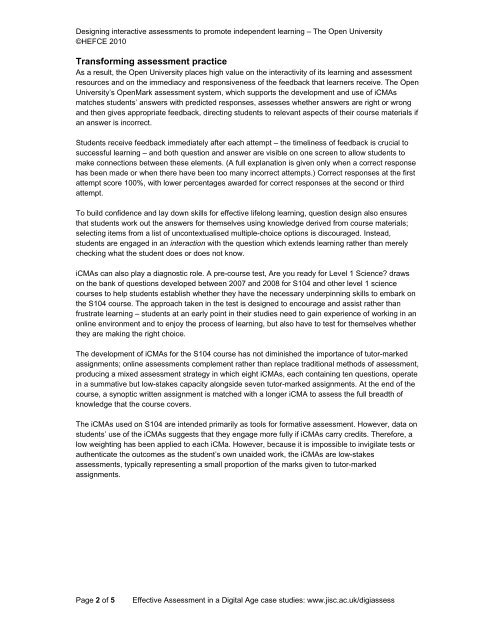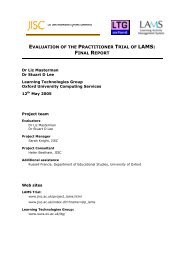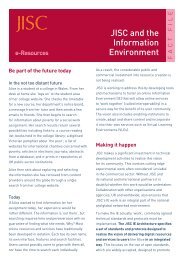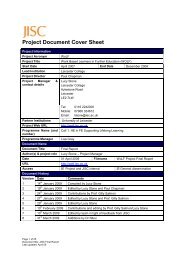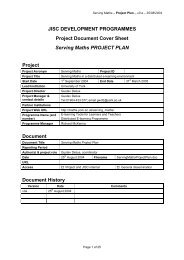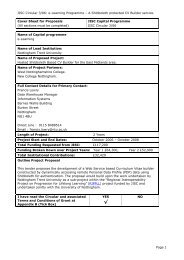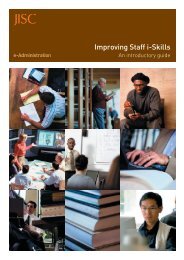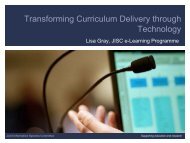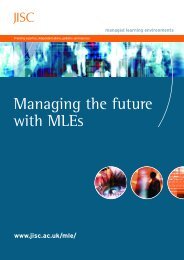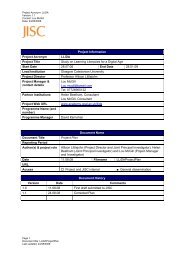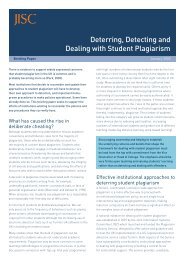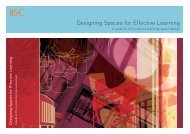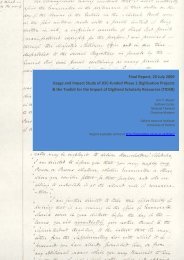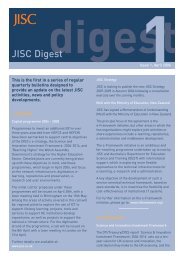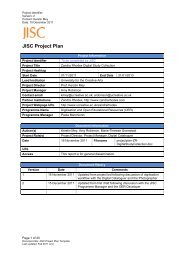Case study 4: Designing interactive assessments to promote ... - Jisc
Case study 4: Designing interactive assessments to promote ... - Jisc
Case study 4: Designing interactive assessments to promote ... - Jisc
Create successful ePaper yourself
Turn your PDF publications into a flip-book with our unique Google optimized e-Paper software.
<strong>Designing</strong> <strong>interactive</strong> <strong>assessments</strong> <strong>to</strong> <strong>promote</strong> independent learning – The Open University<br />
©HEFCE 2010<br />
Transforming assessment practice<br />
As a result, the Open University places high value on the interactivity of its learning and assessment<br />
resources and on the immediacy and responsiveness of the feedback that learners receive. The Open<br />
University’s OpenMark assessment system, which supports the development and use of iCMAs<br />
matches students’ answers with predicted responses, assesses whether answers are right or wrong<br />
and then gives appropriate feedback, directing students <strong>to</strong> relevant aspects of their course materials if<br />
an answer is incorrect.<br />
Students receive feedback immediately after each attempt – the timeliness of feedback is crucial <strong>to</strong><br />
successful learning – and both question and answer are visible on one screen <strong>to</strong> allow students <strong>to</strong><br />
make connections between these elements. (A full explanation is given only when a correct response<br />
has been made or when there have been <strong>to</strong>o many incorrect attempts.) Correct responses at the first<br />
attempt score 100%, with lower percentages awarded for correct responses at the second or third<br />
attempt.<br />
To build confidence and lay down skills for effective lifelong learning, question design also ensures<br />
that students work out the answers for themselves using knowledge derived from course materials;<br />
selecting items from a list of uncontextualised multiple-choice options is discouraged. Instead,<br />
students are engaged in an interaction with the question which extends learning rather than merely<br />
checking what the student does or does not know.<br />
iCMAs can also play a diagnostic role. A pre-course test, Are you ready for Level 1 Science? draws<br />
on the bank of questions developed between 2007 and 2008 for S104 and other level 1 science<br />
courses <strong>to</strong> help students establish whether they have the necessary underpinning skills <strong>to</strong> embark on<br />
the S104 course. The approach taken in the test is designed <strong>to</strong> encourage and assist rather than<br />
frustrate learning – students at an early point in their studies need <strong>to</strong> gain experience of working in an<br />
online environment and <strong>to</strong> enjoy the process of learning, but also have <strong>to</strong> test for themselves whether<br />
they are making the right choice.<br />
The development of iCMAs for the S104 course has not diminished the importance of tu<strong>to</strong>r-marked<br />
assignments; online <strong>assessments</strong> complement rather than replace traditional methods of assessment,<br />
producing a mixed assessment strategy in which eight iCMAs, each containing ten questions, operate<br />
in a summative but low-stakes capacity alongside seven tu<strong>to</strong>r-marked assignments. At the end of the<br />
course, a synoptic written assignment is matched with a longer iCMA <strong>to</strong> assess the full breadth of<br />
knowledge that the course covers.<br />
The iCMAs used on S104 are intended primarily as <strong>to</strong>ols for formative assessment. However, data on<br />
students’ use of the iCMAs suggests that they engage more fully if iCMAs carry credits. Therefore, a<br />
low weighting has been applied <strong>to</strong> each iCMa. However, because it is impossible <strong>to</strong> invigilate tests or<br />
authenticate the outcomes as the student’s own unaided work, the iCMAs are low-stakes<br />
<strong>assessments</strong>, typically representing a small proportion of the marks given <strong>to</strong> tu<strong>to</strong>r-marked<br />
assignments.<br />
Page 2 of 5<br />
Effective Assessment in a Digital Age case studies: www.jisc.ac.uk/digiassess


